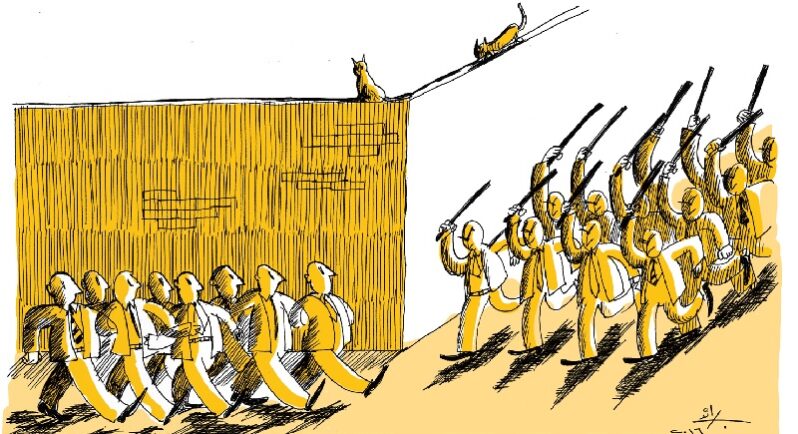Egyptian Austerity: Raising Metro Fares and Increasing Salaries of Ministers

On May 5, 2018, Egypt’s minister of transport issued a decision to increase the prices of metro tickets in the Cairo governorate by 250%. The decision was taken to make up for the financial loss suffered by the National Authority for Tunnels. The minister stated that tickets in Egypt are one of the cheapest in the world, overlooking the low income of Egyptian citizens. On Saturday May 12, 2018, subway stations in the Egyptian capital witnessed protests by citizens over the planned increase. Some citizens even broke into the metro, refusing to use tickets after the price hike.[1]
This decision comes a month after parliament approved an increase in the salaries of the speaker of parliament, the prime minister, members of the government, and governors and their deputies.[2] Accordingly, the net salary of the speaker of parliament, the prime minister, and the ministers is now equal to the maximum wage of around LE42,000 [US$2,345].[3] The amended texts also included a raise in the salaries of deputy ministers and governors of up to 90% of the maximum wage. With regard to pension, Article 4 bis of the law stipulates that the aforementioned categories are entitled to a monthly pension equivalent to 80% of the salary or remuneration as of the date of termination of office. The pension set under the provisions of this law shall be combined with any other pension prescribed by any other law.
Egypt has been suffering from an economic crisis in recent years, prompting government officials and members of parliament to repeatedly call for austerity and rationalization of expenditures to overcome the crisis. It began after the floatation of the Egyptian pound in November of 2016. However, it seems that calls for austerity are only directed at citizens and exclude government and parliament.
Only Citizens are Made to Carry the Burden of the Economic Crisis
Austerity measures started with increases in fuel prices in 2014; the latest of which was an increase of 35% in November 2016. In that same month, Egypt was finalizing its agreement with the International Monetary Fund (IMF).[4] Under the agreement, Egypt would borrow US$12 billion to “address macroeconomic weaknesses and promote overall growth and job creation”. The main points of the IMF loan program included liberalization of the exchange rate (i.e., floatation of the Egyptian pound), reduction of budget expenditures, tax increase, and structural reforms to stimulate economic growth and strengthen social protection programs by increasing the spending on vulnerable groups such as the youth, women and children.[5]
Egypt implemented most of its aforementioned commitments, such as liberalization of the exchange rate, cutting subsidies on fuel, and imposing the value-added tax; all taking a toll on middle and lower classes. On the other hand, no protection measures were taken to increase the ability of middle-class citizens to handle these decisions. This means more impoverishment and a real devaluation of employees' wages. According to data from the Central Agency for Public Mobilization and Statistics, the official poverty rate in Egypt rose from 19.6% in 2005 to 27.8% in 2015. Poor areas in Upper Egypt have the highest poverty rates, with 56.7% living in poverty in 2015.
In the same context, the government circumvented and refused to apply the ruling of the Administrative Judicial Court to increase pensions after the government had been obliged to include the allowances of the last five years of their service.[6]
The Rich Excluded from the Austerity Plan
There has been no commitment to the austerity plan at the level of officials. Rather than revisit the salaries, remunerations, and travel allowances of senior state officials as a means of implementing austerity, the salaries of ministers were raised. There have also been successive increases in the salaries of judges, army and police officers.[7]
It should be noted that the IMF advised the Egyptian government to impose tax forms with progressive effects to help solve the problem of inequality in the distribution of income by increasing the tax rate on higher revenues and wealth. Such forms may include taxes on property, capital profits, and luxury goods.[8] However, the Egyptian government has no intention of increasing the tax burden on companies and the incomes and wealth of the rich. For example, Egypt froze the capital gains tax for two years in May 2015. The tax, which was approved in 2014, amounts to 10% on capital gains of shares listed in the stock market. In June 2017, the Egyptian government extended its suspension of that tax for another three years and imposed stamp fees on every stock exchange transaction.[9] The IMF pressured Egypt to reinstate the tax but it failed. The Egyptian president also cut the maximum income tax on companies and high personal incomes (more than one million Egyptian pounds) from 30% down to 22.5%.[10]
Conclusion
Despite enhancing the protection of economic and social rights in the 2014 Constitution, the policies adopted by the Egyptian government contravene Article 38 of the Constitution which stipulates progressive taxation to develop the state’s resources and achieve social justice and economic and cultural development.
These policies violate Article 27 of the Constitution which obligates the government to eradicate poverty through sustainable development, social justice, raising citizens’ standard of living, equitable distribution of development revenues, reducing income disparities, and adhering to the minimum wage level and a pension that ensures a decent life.
Continuing to adopt such policy will lead to greater prosperity for the upper class and further impoverishment of the middle and poor classes if the state does not intervene to protect citizens by controlling commodity prices, providing employment programs and increasing social spending. It seems that the state does not respond to successive protests and objections to its economic policy.
This article is an edited translation from Arabic.
Keywords: Metro fare, IMF, Egypt, Austerity
___________________________________________________________________
[1] Press release entitled: “Qafz Jamaʿi Fi Mahattat al-Marj”, published in Masrawy on May 12, 2018
[2] Parliament approved the government’s draft law to amend some provisions of Law 100 for the year 1987, see: Mahmoud Hussein’s, “Taʿdil Murattabat Qiyadat al-Dawla…12 Maʿluma Shamila ʿan al-Qanun 100 Lisanat 87”, published in Youm7 on April 16, 2018.
[3] The maximum wage was approved by President Abdel Fattah al-Sisi by a law decree in July 2014, with a maximum of LE 42,000 per month for government personnel, representing 35 times the minimum wage.
[4] See: Mohamed Gad’s “Fi Wathaʾiq al-Qard…Man al-Masʾul ʿan Azmat Misr al-Maliyya Fi Raʾi al-Hukuma Wal Sundouq”, published in Aswat Masriya on January 18, 2017.
[5] A report entitled: “Barnamej Sundouq al-Naqd al-Dawli Fi Misr: Taqyeem Tahaddiyat al-Iqtisad al-Siyasi”, published by the Brookings Doha Center, January 2018.
[6] A number of pensioners filed a lawsuit to obligate the Egyptian government to include the variable wage allowances for the last five years of their service. The court ruled in their favor and ordered the state to add these allowances to their pension.
See: Abdel-Jaihani’s article: “Haythiyyat al-Hukm Biʾilzam al-Hukouma Idafat al-ʾalawat Liʾashab al-Maʿashat”, published on March 31, 2018.
[7] A report entitled: “Al-Athar al-Ijtimaʿiyya Litaʿweem al-Jinaih…Ayna Tadhhab al-Tabaqa al-Mutawassita?”, published by Sasa Post on November 10, 2016.
[8] The aforementioned Brookings Center report.
[9] Press release entitled: “Misr Tumaddid Tajmeed Dareebat al-Arbah al-Raʾsmaliyya 3 Sanawat Idafiyya”, published on Alarabiya.net on May 30, 2017.
[10] Press release entitled: “Al-Maliyya: Al-had al-Aqsa Lidareebat al-Dakhl ʿala Man Yazeed Dakhluhu ʿan 200 Alf Jinaih”, published in Youm7 on August 20, 2015.



